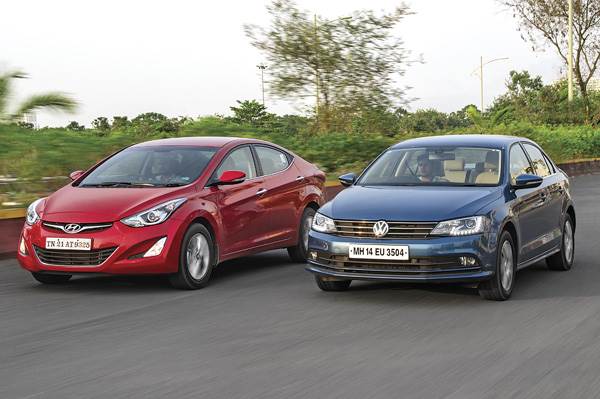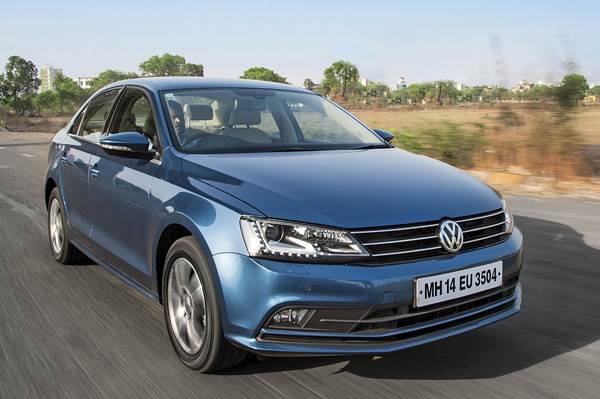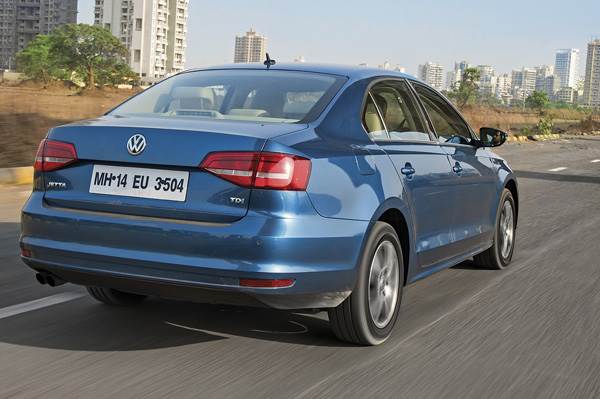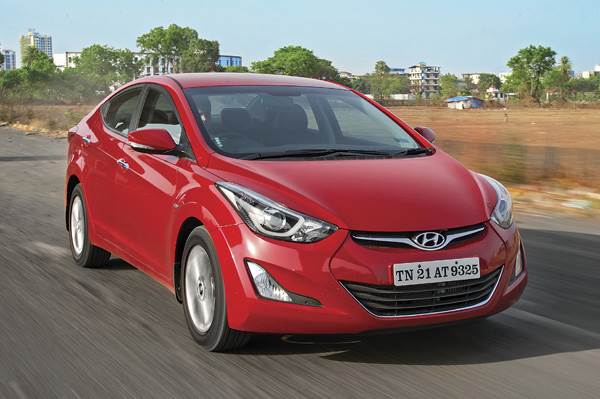Both Hyundai and VW updated their respective diesel executive sedans – the Elantra and the Jetta – earlier this year and we've brought them together for a comparison. Both sedans received minor cosmetic changes on the outside and in, along with some additional equipment. So, which one is worth your money? Here are our impressions from behind the wheel.
Performance & refinement
The diesel Elantra is powered by a smooth and punchy 126bhp 1.6-litre engine. In traffic, there’s a bit of a delay before power comes in, but after that, the engine has decent punch. You do expect more power on a car of this size, but there’s enough punch for stress-free overtaking and cruising. The engine is also very smooth and less clattery than the Jetta’s. The clutch, though, is on the heavier side and in traffic, the Elantra sometimes feels jerky as power comes on and off.
Here, the Jetta has a decisive edge. The bigger 2.0-litre engine makes it a much quicker machine than the Elantra. 0-100kph, for example, is dispatched in 10.90sec, a good second ahead of the Elantra’s time. And it’s not just flat-out performance, the bigger engine also means that you don’t have to fiddle with the gearbox too much. On the downside, the engine note is gravelly when compared to the Elantra and it doesn’t let you forget that it is a diesel.
Ride & handling
The Elantra is good at ironing out bumps at low speeds. Even high-speed stability is acceptable, though the softly sprung Hyundai does tend to bounce and roll a fair bit when driven fast. The cabin is well insulated and this really helps make this Hyundai a soothing cruiser. As far as handling is concerned, the Elantra feels predictable and safe when pushed hard, and is probably one of Hyundai’s most secure and best-handling cars.
If the Elantra’s ride is good at low speeds, the Jetta’s is even better; the stiff body and supple suspension simply absorb bumps with ease. On the highway, the ride stays flat and you feel minimum movement in the cabin over most surfaces. Even around corners, the Jetta feels tidy, body roll is well contained and the VW feels impressively light on its feet. The steering is very direct, it’s light and the Jetta is quite enjoyable on a twisty road too.
Interiors
Hyundai has gone for an all-black theme and the dashboard has been changed slightly too, with a new audio system and the welcome addition of a touchscreen. The interiors reflect the impressive exterior design language. The door pads are well sculpted and so is the multi-layered dash, replete with ridges and curves that flow into the centre console. The steering wheel looks and feels great, while the instrumentation is clear and easy to read. Even the fit and finish is really good.
The Jetta’s dashboard design is clean and easy to use, but it just feels a bit utilitarian compared to the Elantra’s. Where the Hyundai dashboard comes across as a younger, slicker design, the Jetta’s has an old-school look to it. Where it scores is with that typical strong European build and the attention to detail and fit-finish. The Jetta’s touchscreen is larger and much easier to use than the Hyundai’s and the front seats are larger and more comfortable too.
Space & practicality
There’s plenty of legroom for rear seat passengers here and the bench itself is comfortable, with good thigh support and a flattish floor. But it is set lower than normal, so getting in and out takes a bit more effort. Also, the seat-back is a bit too reclined and the swooping roofline eats into headroom. Due to the rising shoulder line, visibility from the back seat is impeded as well. The front seats, though, are wide and supportive, making even long journeys comfortable.
The Jetta has the more comfortable back seat in this test. You sit higher, at almost the ideal height, the backrest is perfectly inclined and legroom is much better than in the Elantra. The seat base is generous and superbly contoured too. If there is a fault, it’s with the cushioning which is a touch too hard and the backrest that’s a wee too upright. The boot capacity is a good 510 litres and the wide opening hatch makes it much easier to access than the Elantra’s boot.
Equipment
Like all Hyundais, the Elantra comes loaded with equipment. Even the base variants get front airbags, ABS, parking sensors, dual-zone climate control, USB and aux-in ports for the audio system, electric mirrors, Bluetooth and remote locking. Mid ‘S’ versions add a rear-view camera, electric folding mirrors and keyless entry and go. Top SX versions get cruise control, a powered driver’s seat, auto headlamps, Vehicle Stability Management (VSM) and cooled front seats.
In terms of kit, the Jetta fares well and there’s all the equipment you’d expect from a car at this price. You get dual-zone climate control, parking sensors, remote locking, Xenon headlamps, cruise control and a media input port. Also, the well-damped glove compartment lid conceals a six-CD changer and an SD card port. Design-wise, the cabin is clean and simple and the additional display systems are easy to read and are operated by large buttons.
Verdict
Hyundai's Elantra is no doubt, a value-for-money product. It's attractive, is as well-equipped as Hyundais come and is also very comfortable to be in. But then, driving it isn't exactly a smooth experience in heavy city traffic and at speed, it bounces around a fair bit. The Jetta, on the other hand, stays rock steady at any speed. The engine is responsive and the Jetta is quite a fun car from behind the wheel. It is more expensive, but then, it feels solid and a lot more premium than the Hyundai. Overall, the VW Jetta is the winner in this comparison.






Comments
Member Login
Personal Details
No comments yet. Be the first to comment.